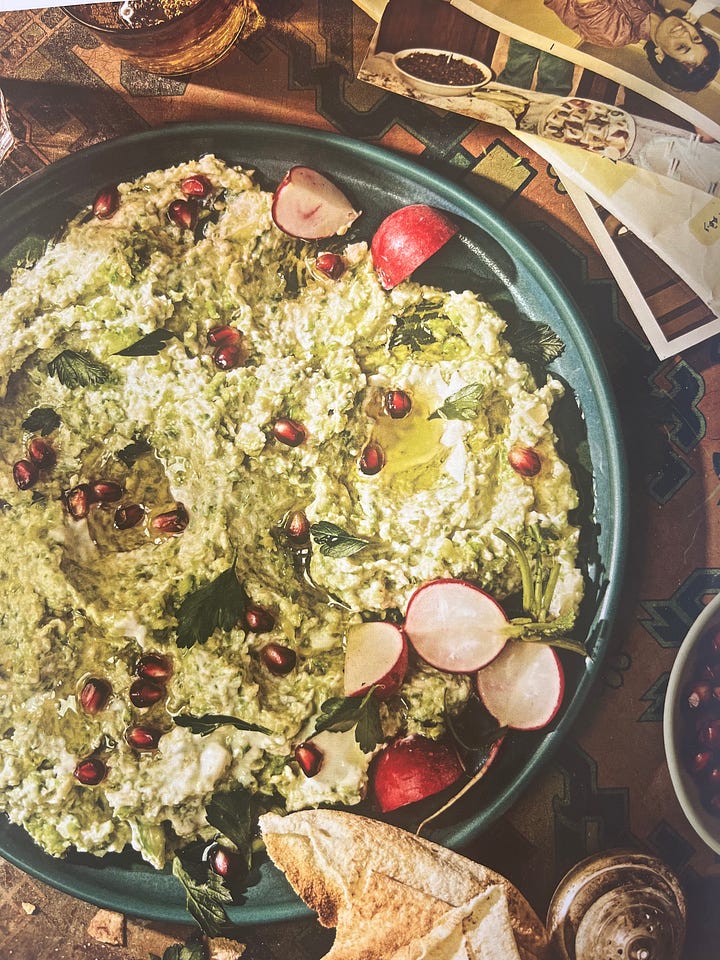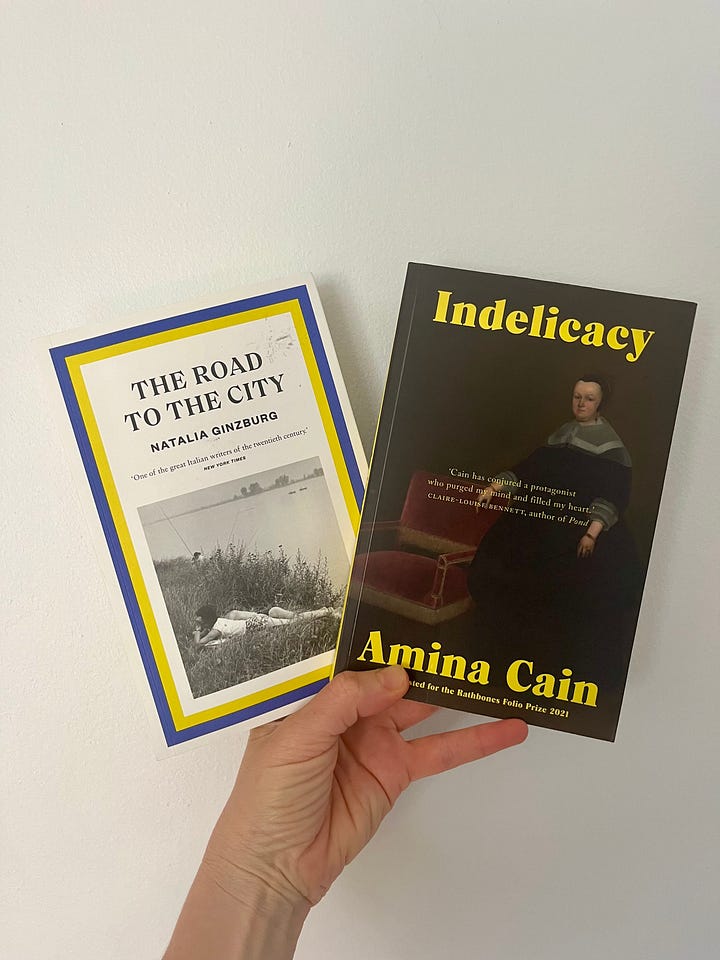

Has everyone finished Intermezzo? What did you all think? Very curious to hear. (Side note: This past weekend, Substack published their weekly newsletter, one of whose topics was Rooney discourse, and yours truly was featured! I screamed! Nice shout-out for this little ‘Stack.) Anyway, after finishing Intermezzo I fell into a reading spiral. This happens to me a lot – I get extremely into a book and that energy unleashes a reading frenzy. I went down a rabbit hole of female-published books (both of which I purchased on my last trip to London). Read on for that below, plus a new Jordanian cookbook obsession (and recipe, of course).
Read
The Road to the City by Natalia Ginzburg, translated from the Italian by Frances Frenaye, pub. 1947
Buy: Daunt Books (the shipping price is worth it for the cover art alone) or used online or at your local bookshop (or library!)
Elena Ferrante likely wouldn’t exist without Natalia Ginzburg, one of Italy’s foremost writers, whose books have thankfully been reissued over the past few years (Daunt’s releases are particularly special; I want to collect them all!). Her spare, bleak prose is bare on the surface but bubbling beneath – at least in this novella – is a deep female yearning: to escape poverty, to abandon youth, to fall in love.
Seventeen-year-old Delia lives in an Italian village. The family, poor and hardened, has five children, plus they care for Delia’s cousin, Nini. Delia years to escape her circumstances – her sister, Azalea, lives in the city with her husband and various lovers and Nini soon moves there to work in a factory – and visits frequently, playing at a life unlived. She suspects Nini might be in love with her, and questions whether she’s in love with him, but this is never spoken of.
Soon, Delia gets tangled up with Giulio, a wealthy boy studying to be a doctor, who takes advantage of and eventually impregnates her. Delia’s mother works hard to convince Giulio’s family that a marriage is necessary. While she waits for the wedding, Delia is sent to live with her aunt and cousin in a remote village for the duration of her pregnancy, so as not to humiliate the families and anger her father, who refuses to look at her. Her aunt Elide is cruel; her cousin, Santa, cares for her, yet Delia is lonely, abandoned and powerless. All of this is narrated from a position of aloofness despite the dramatic situation. This is a story of entrapment and escape, of unrequited love and the lengths people go to live better…and then, it questions what the definition of a ‘better’ life actually is. I love Italian translations, and if you do, too, Ginzburg won’t disappoint.
Read: Indelicacy by Amina Cain, pub. 2020
Buy: Bookshop.org or your local bookstore (or library!)
Whoa, this novel! If I hadn’t picked it up in London I never would’ve heard of it. Cain’s prose actually shares commonalities with Ginzburg’s: pared-down with a rich undercurrent of meaning. Our narrator is Vitoria (whose name we fascinatingly only learn about ¾ through the book via another female character), a cleaning woman working in a museum in an unknown city. She spends her days working for little pay and looking at paintings, but yearns to be a writer. At home she writes for hours in a notebook, wondering what she’s getting at. She never expresses this desire to anyone, even her friend at work, Antoinette. The hunger to write hovers in her consciousness, despite her lot in life. A flame is lit but has no place to burn.
Vitoria eventually meets a man – an extremely wealthy man – and, next thing we know, she’s living in luxury, no longer working, and being waited on by a maid of her own. The change is swift: She’s now expected to wear gowns and gold (which she quickly gets accustomed to), socialize at parties with other wealthy individuals, and have endless sex with her husband. She eventually begins to write in her spare time, even coining her ‘office’ what her husband will only refer to as her ‘sitting room.’ Here, she spends hour upon hour in her notebooks, writing about art and her observations of the world. She goes about her wifely duties but we, as the reader, know that her life as a writer is who she really is.
As her world expands, Vitoria realizes she doesn’t love her husband, that she would rather live in poverty and write than in luxury with a man who doesn’t take her seriously. What happens next is almost O’Henrian. I’ll let you read it to find out for yourselves.
Eat
One of the most special bookshops in New York is Kitchen Arts & Letters, a store dedicated to all things culinary. I live vicariously through their newsletters, always full of rarities and recommendations. My most recent purchase is Thuraya: Recipes from Our Family’s Kitchen in Jordan, written by Nadeem Mansour. I know a lot about the food of the Levant but I’d never specifically cooked Jordanian food (nor did I own a Jordanian cookbook). After reading the book cover to cover I know I’ll never stop cooking from it. It’s so special, full of family history, gorgeous photographs and incredibly moreish dishes; half of my copy is dog-eared. For dinner with friends this past weekend I made Mutabal Kousa, a delicious spread using the last of this season’s zucchini. Everyone loved it, so I’m publishing it here, in hopes that it gets you more familiar with the cuisine of Jordan. I highly recommend you buy the book, too.
Nadeem Mansour’s Mutabal Kousa
Serves 6
7 cups grated zucchini (Ed note: I used 3 XL zucchinis for this)
1 teaspoon Kosher salt, divided
4 tablespoons evoo, divided
1 yellow onion, finely chopped
5 cloves garlic, crushed, divided
1 batch Tahinieh (recipe below)
½ cup plain 3.8% yogurt (Ed note: I think any yogurt that isn’t nonfat will do)
¼ cup pomegranate seeds, to garnish
3 sprigs parsley, to garnish
Pita bread, for serving
Tahinieh
Makes 1 batch for Mutabal Kousa
½ cup tahini
¼ cup cold water
¼ cup plus 1 tablespoon lemon juice
2 gloves garlic, crushed
¾ teaspoon Kosher salt
For the Mutabal Kousa: On a baking sheet, spread the grated zucchini and sprinkle with ½ teaspoon of the salt, mixing well. Let stand for 30 minutes, then squeeze out excess moisture with your hands (Ed note: I used a tea towel) and set aside.
While you’re waiting for the zucchini to drain, make the Tahinieh. In a bowl, whisk together the tahini and water until a thick paste forms. Add the lemon juice, garlic and salt and then whisk until creamy and light in color. Add more salt to taste if desired. Set aside.
Back to the Mutabal: In a skillet over medium heat, heat 2 tablespoons of the evoo until it shimmers. Add the onion and cook until translucent, about 4 minutes. Add 2 cloves of the garlic and cook for another minute. Add the grated zucchini and cook, stirring occasionally, until softened, 8 to 10 minutes. Transfer to a fine-mesh sieve and let drain until cool, about 30 minutes. Using your hands, squeeze out any excess moisture. Transfer to a bowl and set aside.
In a small bowl, combine the tahinieh, yogurt, remaining salt, and remaining garlic. Stir well. Add the tahini-yogurt mixture to the zucchini mixture and stir until well combined.
Transfer the spread to a serving dish, top with the pomegranate seeds, drizzle with the remaining evoo, and garnish with parsley. Serve with pita bread.




I can attest to the deliciousness of this Jordanian dish. Indelicacy sounds like a modern must-read. You've got me wanting to know what happens next!
I'm reading A Horse At Night right now and have put Indelicacy on my list! Love a good reading spiral. I'm in quite the opposite situation and mired in Jonathan Strange and Mr. Norrell and feeling like it will never end!